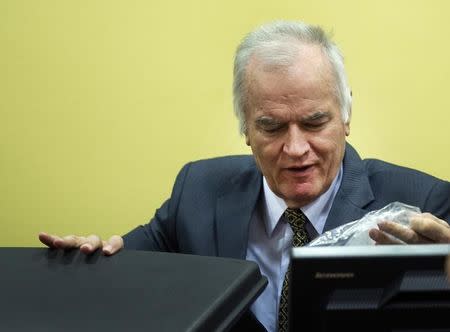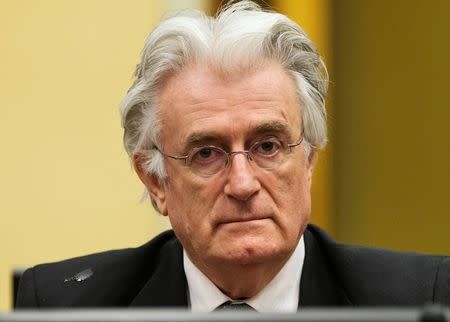Trial of Bosnian Serb commander Mladic enters final stage
By Stephanie van den Berg THE HAGUE (Reuters) - Prosecutors begin closing arguments on Monday in the genocide trial of former Bosnian Serb military commander Ratko Mladic, marking the final stage of the last major case at the Yugoslav war crimes tribunal. Mladic, 74, faces up to life imprisonment for two counts of genocide and nine counts of crimes against humanity and war crimes at the International Criminal Tribunal for the former Yugoslavia (ICTY). A former general who headed the Bosnian Serb separatist forces, Mladic is one of the top suspects in the massacre of more than 8,000 Muslim men and boys from the Srebrenica enclave at the end of the 1992-95 Bosnian war. The closing arguments are expected to run through December 15, whereafter judges will go into deliberations. A judgement is likely in 2017. Mladic was charged alongside former Bosnian Serb political leader Radovan Karadzic, who was convicted and sentenced to 40 years in prison in March. Prosecutors say Mladic jointly masterminded a conspiracy with Karadzic to "ethnically cleanse” large parts of Bosnia of Muslims and Croats and carve out a pure Serbian state during the violent breakup of federal Yugoslavia in the 1990s. Mladic was frequently mentioned in the Karadzic judgement and specifically named as a member of all the joint criminal enterprises for which Karadzic was found guilty. According to the Karadzic judgement, Mladic shared a goal to “permanently remove Bosnian Muslims and Bosnian Croats from Bosnian-Serb claimed territory through the commission of crimes”. Mladic's lawyers have complained that the former general, a frail picture of the wartime leader, has already been found guilty and accused the tribunal of systemic bias. A defence motion to declare a mistrial due to this alleged bias was dismissed earlier this year. Karadzic and Mladic were indicted shortly before the end of Bosnia's war, which claimed up to 100,000 lives, but spent more than a decade living on the run in Serbia before their arrest. When Mladic was finally caught in 2011 he was in poor health following a series of strokes that left him partially paralysed. Defence lawyer Branko Lukic said the strokes have caused gaps in his memory so that he was unable to distinguish fact from fiction, but judges ruled he was fit enough to stand trial, which has so far lasted 4.5-years. Established in 1993, the tribunal indicted 161 individuals from all sides of the conflict, including heads of state, prime ministers, army chiefs-of-staff and other political and military leaders. So far, 83 were convicted and sentenced. (Edited by Anthony Deutsch and Alexandra Hudson)

 Yahoo News
Yahoo News 

